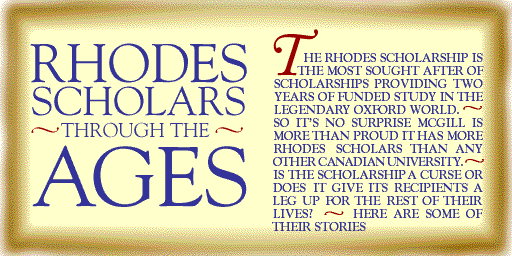[ Complete list of McGill Rhodes Scholars ]
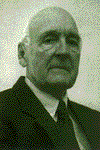 |
David Wanklyn, MSc'51, PhD'52
Rhodes Scholar 1946
Soldier, Nuclear Physicist, Retired
At my Rhodes interview I was asked to elaborate about my plan to study "Unclear Physics." I meant to write "nuclear physics" but my handwriting tripped me up.
Nonetheless, I received the Rhodes Scholarship and returned to McGill to do a PhD in nuclear physics. I worked at the Radiation Laboratory then went to work in the sugar industry, initially in engineering, for the next 30 years. The Rhodes Scholarship certainly changed my life for the years 1946-1949, and it left me with an improved ability to learn, a broader general outlook, and many pleasant memories. The Scholarship remains an important milestone but I do not feel that my life was changed by it.
|
 |
Mervyn L. Weiner, BCom'43
Rhodes Scholar 1946
Chevy Chase, Maryland
In 1946, I was an artillery captain posted to the Army's repatriation depot in Aldershot, England, and saw a notice inviting members of Canada's Armed Forces to apply for a Rhodes Scholarship. That was when I first contemplated a Rhodes Scholarship as a possible, if improbable, route to re-entering civilian life.
The daily life for Rhodes Scholars was considerably different then. For instance, the caloric demands of winter rowing training and spring racing were not always easy to satisfy while I rowed for Balliol in an England still on rations. In 1949, I had a summer job at the United Nations which led, in 1951, to a full-time job with the then tiny and virtually unknown Washington-based International Bank of Reconstruction and Development, now The World Bank. I was married three months later, leading my wife to remark that I married the Bank first, and then her.
I left the World Bank after 33 years as Director-General, Operations Evaluation, in 1984 and continued to consult. But it is my most recent adventure, in the Churchillian mode, making visual art that has turned out to be unexpectedly fulfilling. If I can still recall the purplish cast of a late afternoon sky over Christ Church meadow, why didn't I begin back then?
|
 |
Charles Taylor, BA'52
Rhodes Scholar 1952
McGill's renowned philosophy professor thinks the Rhodes Scholarship committee gave him "points" for being bilingual, but couldn't think of much else that recommended him. Others might cite sheer academic excellence. In all, Taylor spent 11 years at Oxford completing a PhD and working with philosopher Isaiah Berlin. "This was the post-war period," Taylor recalled. "There was still rationing but a feeling that prosperity had arrived.
"There were brilliant graduates from all over, and a tremendously vigorous intellectual life. People were forming societies to discuss various topics. The tutorial system was used which is a superb system if it's done by people who are into it," he recalled recently. Taylor says the Rhodes Scholarship allowed him to travel widely in Europe and study European philosophy. "Had I gone to the United States, I don't think I would have had the exposure to French and German thought which shaped my thinking," he says. Today, the much decorated philosopher has a two-year Canada Council grant to write a book on the political culture of modernity. (He returns to teaching at McGill in September 1998.) Charles Taylor lives in Montreal with his wife, Aube Billard, a student of art history, whom he married in December 1995. which is a superb system if it's done by people who are into it," he recalled recently. Taylor says the Rhodes Scholarship allowed him to travel widely in Europe and study European philosophy. "Had I gone to the United States, I don't think I would have had the exposure to French and German thought which shaped my thinking," he says. Today, the much decorated philosopher has a two-year Canada Council grant to write a book on the political culture of modernity. (He returns to teaching at McGill in September 1998.) Charles Taylor lives in Montreal with his wife, Aube Billard, a student of art history, whom he married in December 1995.
|
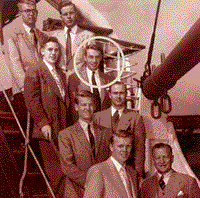 |
Storrs McCall, BA'53
Philosophy Professor
McGill University
Who knows what impresses the Rhodes Scholar committee? When I applied they seemed interested in my summer job on Baffin Island studying land-locked cod. Professor Max Dunbar's little research trawler "Calanus" left me and another student at Ogac Lake on the shores of Frobisher Bay in July and picked us up in September. During that time we caught many of those intriguing cod, returning via Churchill after a hazardous journey across Hudson's Bay.
They say the definition of a Rhodes Scholar is "a man who had a glorious future." I never felt any pressure but the Rhodes Scholarship gave me some momentum early in my life.
At that time, in the 1950s, Oxford led the world in philosophy, and I signed up for a new degree called the "Bphil." Ludwig Wittgenstein died in 1951, but the English translation of his Philosophical Investigations had just appeared, and every graduate seminar was filled with students debating excitedly its enigmatic contents. Wittgenstein was the clear winner no one succeeded in understanding him, and yet his grip on our imaginations was unrelenting. When I left Oxford I taught at McGill, and later shuttled back and forth for 11 years between the University of Pittsburgh and Makerere University in Uganda, where I instituted the teaching of philosophy in 1965. My wife Ann and I spent five unforgettable years in Uganda and two of our children were born there. Our last six months fell under Idi Amin's dictatorship, and we grieved the devastation with our Ugandan friends. Had it not been for the Rhodes, things would have gone very differently for me no one succeeded in understanding him, and yet his grip on our imaginations was unrelenting. When I left Oxford I taught at McGill, and later shuttled back and forth for 11 years between the University of Pittsburgh and Makerere University in Uganda, where I instituted the teaching of philosophy in 1965. My wife Ann and I spent five unforgettable years in Uganda and two of our children were born there. Our last six months fell under Idi Amin's dictatorship, and we grieved the devastation with our Ugandan friends. Had it not been for the Rhodes, things would have gone very differently for me even though my present views are far removed from Ludwig Wittgenstein's! even though my present views are far removed from Ludwig Wittgenstein's!
|
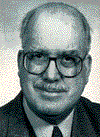 |
John M. Fraser, BA'55
Retired Canadian Ambassador
Ottawa
Although my academic and student activity credentials were respectable, my athletic accomplishments were close to non-existent. Many Rhodes Scholarship selection committees would no doubt have ruled me out for that reason. Fortunately the Quebec committee took a flexible view of the athletic dimension.
All I can remember about my interview is that I was terrified of over-sleeping and missing it. I asked various friends to telephone that morning. I woke early, of course, and spent the following half-hour answering the phone.
When I left McGill, I assumed that I would become a newspaper reporter, although the foreign service was on my mind I served for 36 years. My foreign service career included involvement as China Desk Officer in the negotiations for establishing diplomatic relations with the People's Republic of China from 1968 to 1970. I then went to Peking in January 1971 to open our Embassy as Chargé d'Affaires. In 1980 I was appointed Ambassador to Poland, where Solidarnosc was suppressed by the imposition of martial law in December 1981. In 1983 I was transferred to Belgrade, as Canadian Ambassador to Yugoslavia. Returning to Ottawa in 1987, I became the Director-General of the Foreign Intelligence Bureau (renamed the Foreign Assessments Bureau a year or two later). After two years as a Foreign Service Visitor at Carleton University I retired from the Public Service in 1994. I served for 36 years. My foreign service career included involvement as China Desk Officer in the negotiations for establishing diplomatic relations with the People's Republic of China from 1968 to 1970. I then went to Peking in January 1971 to open our Embassy as Chargé d'Affaires. In 1980 I was appointed Ambassador to Poland, where Solidarnosc was suppressed by the imposition of martial law in December 1981. In 1983 I was transferred to Belgrade, as Canadian Ambassador to Yugoslavia. Returning to Ottawa in 1987, I became the Director-General of the Foreign Intelligence Bureau (renamed the Foreign Assessments Bureau a year or two later). After two years as a Foreign Service Visitor at Carleton University I retired from the Public Service in 1994.
|
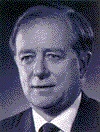 |
Yves Fortier, BCL'58
Chairman and Partner, Ogilvy Renault
Montreal
Being selected as one of Quebec's Rhodes Scholars in the fall of 1957 remains today one of the most moving moments of my life. It afforded me the opportunity to spend two years at Oxford in the company of exceptional fellow students. The Oxford environment, the new friends I made, my studies, have all left their indelible mark on me.
It was only some six months prior to the interview that I began to think about the possibility of becoming a Rhodes Scholar. I did so at the instigation of my girlfriend's father who had studied at Cambridge (!) and who also had two cousins who had been Rhodes Scholars (Erskine and Norwood Carter from New Brunswick).
I do remember the breadth of the questions during the Rhodes interview. Clarence Campbell, then President of the National Hockey League, engaged me in a conversation about sports in general, hockey in particular. The Chairman of the committee, N.R. Crump, Chairman of the Canadian Pacific Railway, asked me questions about the building of the railway in the 19th century and so on. To this day, I remember the telephone call informing me that I had been selected. This was on a Saturday afternoon. That evening with my girlfriend Carol Eaton (now my wife) and classmates from McGill was memorable, as you can imagine.
Prior to going to Oxford, I intended to become a lawyer. When I returned to Canada, I had not changed my mind but I had a far broader vision. Principally, Oxford made me more intellectually curious about not only the law, but also history, politics, the arts, etc.
I have had a very busy life since I returned from Oxford with the privilege of serving as Canada's permanent representative and Ambassador to the United Nations from July 1988 to January 1992.
|
|
Gordon J. Wasserman, BA'59
Special Adviser (Science and Technology) to the Police Commissioner of the City of New York
In the summer after third year, I had a World University of Canada Fellowship and met Peter Wiles, an economist at New College, Oxford. This was the first time I thought about what the Rhodes Scholarship might represent in terms of intellectual development and pure pleasure.
I asked McGill Principal F. Cyril James for his advice. He was encouraging and said that he would be delighted to recommend me. That clinched it. I had been advised that the Quebec interview panel was not well disposed towards Jewish candidates, and a Catholic priest quizzed me about my involvement with Hillel. Yet far from holding my religious involvement against me, this apparently counted strongly in my favour.
Winning the Rhodes Scholarship completely changed my life. I fell in love with (and in) Oxford and stayed for eight years, first as a graduate student, then as a teacher and researcher in economics. In 1967, I became the first Economic Adviser of the Home Office and Assistant Undersecretary of State for Police Science and Technology. I took voluntary early retirement in June 1995 and am now Special Adviser to the Police Commissioner of New York City.
|
 |
John A. Coleman, BA'75, LLB'80, BCL'80
Partner, Ogilvy Renault
Montreal
I presented myself with long hair, a corduroy jacket and jeans (McGill uniform for 1974), at the exclusive Mount Royal Club before a committee which included Peter Blaikie, Francis Fox, Michel Vennat and Yves Pratt. I was fortunate not to have to compete with 50 percent of the population; women were ineligible then. I believe I endeared myself to the committee by chain-smoking throughout the interview and, after leaving the room, returning in the middle of their post-interview deliberation to retrieve half a pack of cigarettes that I had forgotten.
Did I enjoy my Oxford experience? I must say, in my case, Oxford was an acquired taste. My first year got off to a rough start. Picture some 40-odd North American Rhodes Scholars setting sail from New York on the QEII in September 1975. The Atlantic was huge and awe-inspiring but nothing like some of the egos on board, each scholar feeling somehow that he had to justify himself.
When we arrived at Southampton, I knew it would be an interesting year. Upon docking the ship was impounded. It was rumoured that arms destined for the IRA had been found on board. We didn't get our luggage for a month.
The next devastating moment occurred when, after struggling day and night to read in the original Greek and prepare an analysis of one of Aeschylus' tragedies, with thoughts of Stephen Leacock's tales of pipe-smoking tutors, I proudly read my work to my tutor. After contorting his body into a clove hitch that would have gained him acceptance to the Cirque du Soleil, the tutor stared up at the ceiling and muttered disdainfully that my analysis was, he supposed, "a rather North American way of looking at the question." I changed my program from Greek philosophy to law.
Perhaps the very "lawyerly" composition of the Rhodes selection committee explains how I ended up practicing law today at Ogilvy Renault; frankly, had someone foretold my future, I would never have believed it. Given the mores of the times, I confess that I might have even shuddered at the thought!
|
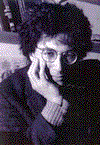 |
James Der Derian, BA'78
Professor, Political Science
University of Massachusetts at Amherst
I consider my Rhodes scholarship as a "propitious accident." After McGill, I visited a professor at MIT who sold me on the place and insisted I rush to pick up the application forms. By accident I also picked up an application for a Rhodes. I filled it out and was invited to an interview in Chicago, my home district. It started with a ridiculous cocktail hour with very pointed questions: Why I had chosen to attend McGill? Since the real reason was a bit lame my older sister's best friend had a brother who had gone there and liked it my older sister's best friend had a brother who had gone there and liked it I played up McGill's good reputation and low tuition. That seemed to satisfy them I was not a draft dodger or un-American. I played up McGill's good reputation and low tuition. That seemed to satisfy them I was not a draft dodger or un-American.
One physicist, who noted I had not taken a single science course at McGill, asked me to relate a Shakespearean play and the law of thermo-dynamics. I bluffed by saying something about entropy and The Tempest. When I was selected I felt elation. Later, I also felt guilt: after all, this was money tainted by the legacy of Rhodes' exploiting of southern Africa. During our passage on the QEII to England, a small group of us organized a petition requesting an inquiry into the holdings of the Rhodes Trust in South Africa. Others were less impressed. I felt elation. Later, I also felt guilt: after all, this was money tainted by the legacy of Rhodes' exploiting of southern Africa. During our passage on the QEII to England, a small group of us organized a petition requesting an inquiry into the holdings of the Rhodes Trust in South Africa. Others were less impressed.
At Oxford I switched my major (Charles Taylor had already covered the philosophy material at McGill) and graduated in international relations. Then I moved to New York to try to make it as a photographer. No one took me seriously. I quickly ran out of money, and found a job serving tea to graduate students at the Columbia School of International Affairs. One day the Dean, Al Stephan, struck up a conversation. When he found out that I was a "Balliol Man" (our college at Oxford), he was aghast. The old boys' network kicked in, and the next semester I found myself teaching international relations at Columbia the last of a series of fortunate accidents. the last of a series of fortunate accidents.
|
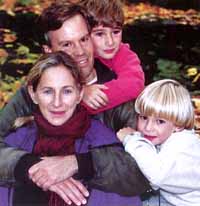 |
Dr. Geoffrey E. Dougherty, MD'79, MSc'86
Rhodes Scholar 1983
Director, Intensive Ambulatory Care Service,
The Montreal Children's Hospital,
& Assistant Professor of Pediatrics
& Epidemiology and Biostatistics, McGill University
I was one of the youngest Rhodes Scholars, if not the youngest, from Canada. The selection committee asked me about the moral issues surrounding abortion. I felt particularly strongly about this as a Roman Catholic, and my answer focused on the balance of harm and relative interests of the fetus and the mother. In the end, I believe I came down with some struggle on balance in favour of a woman's right to choose.
At Oxford, I played ice hockey and lacrosse, and was President of the Raleigh Club (a political society). I experienced an incredible freedom to discuss, to think, and to read. In that sense, returning to Montreal was a substantial letdown, and I think I was actually mildly depressed for a period of time. I completed medical school at McGill, and am now a pediatrician and an epidemiologist with a wife and young family. We live close to McGill, and I teach McGill medical students.
I have not followed the typical course of many Rhodes Scholars who ventured into political or public life, so it did not change me in that sense. Rather, perhaps, it reinforced my pre-existing will to be my own person, go my own way, and believe in my own positions and thoughts.
|
 |
Warren Cabral, BA'82
Rhodes Scholar 1982-1983
Partner, Appleby, Spurling & Kempe,
Co-Owner, Warren Cabral TV Production
Bermuda
I have read articles in the Canadian press denigrating the Bermuda award of the Rhodes Scholarship. Let me simply inform Canadian readers that the majority of recent holders of the Bermuda Rhodes were educated at leading Canadian private schools, and thereafter at leading Canadian universities, typically finishing within the top five in their class. The Bermudans concerned are as academically qualified as any Canadian holder. If Cecil Rhodes saw fit to include Bermuda in the scholarship cachement, then it does not fall to modern commentators to criticize.
The idea to apply for the scholarship was suggested by a McGill friend as we rode side by side on mopeds blocking the Bermuda traffic. My inquiries were strongly encouraged by the late Chester Butterfield, BA'48, then secretary of the Bermuda Rhodes Committee.
At the interview, I was asked to deal with Bermuda's racial questions. I approached these as a person of Portuguese origin, who was classified for census purposes in a category other than "white." I flatter myself that my practical racial views met with the committee's approval. Equally, I imagine the committee wanted to introduce a new type of Bermudan who would represent the country at Oxford.
Winning the Rhodes Scholarship had a profound effect on my life. It was at Oxford that I felt most at home and accepted. It was a richly romantic world.
Academically, I did not rate Oxford as highly as I did McGill, notwithstanding one of my tutors' description of my McGill degree as a "certificate." That is not to say that Oxford is not stuffed with clever people and brilliant books. It is just that, when it comes down to the mechanical process of training undergraduates, it fails. Tutors disdain their role as teachers and there is no system whereby students "rate" them, as was the case at McGill. Reading materials are poorly organized, and the absence of structure means, at least for a North American, that it is difficult to see the way forward to acquiring knowledge.
I enjoyed the various rituals of life at Oxford, including dressing up for dinner and passing port to the left. Indeed, I am still puzzled about passing the port: if the decanter is supposed to stay in perpetual motion, I have never understood when one is to drink it.
My wife is Louise (Foister) Cabral. We met through friends when I was passing through Oxford on a holiday. So you could say as a consequence of Cecil Rhodes, I am now a happily married man.
|
 |
Will Hinz, BCom'83, DipEd'88, MA'91,
Rhodes Scholar, 1983-86
Civil litigator, Nellivan Power
Ottawa
If I were to have dinner with Cecil Rhodes, I would thank him for giving me the opportunity to spend three wonderful and stimulating years at Oxford.
I recall that my interviewers asked me: If you were the President of the United States, would there be any circumstances in which you would authorize the use of nuclear weapons? After a long pause, I replied: "If I were the President of the United States, I would not tell you or anyone else whether I would ever actually authorize the use of nuclear weapons. By keeping everyone guessing, the deterrent value of possessing nuclear weapons would remain intact."
The best things about Oxford: the tutorial system and the quality of instruction, meeting students from around the world, and the English pubs (not necessarily in that order). The worst things about Oxford: college food, wet and dreary winters, and an absence of computer technology (at least during the mid-eighties).
|
 |
Lesley Fellows, BSc'90, MD'95
Resident, Montreal General Hospital
The dinner event in Halifax was a little sadistic, with the selection committee suggesting that our table manners were being graded. Meanwhile, this group of intense, ambitious people attempted polite conversation while surreptitiously checking out the competition.
The interview itself was something of an anti-climax after surviving dinner and the entire day of nail-biting before my turn arrived. I didn't have long to sweat before I received the phone call telling me I had been selected.
After the initial elation wore off (which took some time!), I had to come to terms with this sudden twist in my plans. Medical school had to be deferred, and my significant other talked into a two-year trans-Atlantic relationship.
The highlight of Oxford was the fascinating array of people. I played basketball for the university on a team of foreign students. Between the 12 of us, we spoke 16 languages, with a diversity of backgrounds to match.
I also enjoyed the charming, eccentric dons and profs that I encountered at formal dinners, particularly those who didn't take it all too seriously. I recall one dinner at Rhodes House, seated next to a College principal who explained solemnly that Cecil Rhodes had laid aside funds for this dinner with the express purpose of polishing our colonial manners. She then proceeded to induct us into the mysteries of "passing the port," a skill I have had cause to call upon since more often than one might imagine.
Being a woman Rhodes Scholar did lead to a sense of subversiveness. Despite the fact that I met the criteria of the scholarship almost to the letter, I knew full well that I was not the sort of person Cecil Rhodes had been planning to train to go back home and lead Her Majesty's Colonies to greater glory.
I finished my DPhil, between college wine tastings and games of croquet. I then returned to McGill to study medicine. I hope eventually to combine clinical practice with basic research. And I am trying not to forget what I learned at Oxford . . . (now, is the port passed to the right, or to the left?).
|
 |
Fiona S. Stewart, BA'91
Fiction Editor, Harper Collins
London, England
When measured against the criteria outlined by Cecil Rhodes in his will, I failed miserably - a strapping young man who excelled in sport I was not, and I lacked the element of brutality that Rhodes unofficially recorded in his diary as a desired characteristic for all Rhodes Scholars. Not only was I a woman whose principal academic interest was feminist literary theory, but my 'sports' were helping to coordinate McGill Nightline and editing fiction for McGill's literary journal, Scrivener. I think it's worthy to note I was the only McGill applicant who didn't attend a private school.
The selection process was lengthy and intense: six letters of reference, an essay, a series of interviews, and of course the dreaded cocktail party, where the entire selection committee and all the hopeful candidates gathered together in an "informal" setting to test our social skills. It was held in a grand room at a private club and was full of highly intimidating undergraduates, many of whom had flown back from their Ivy League universities in the States just for the occasion. I got trapped in a corner by one Harvard hopeful, whose opening line was, "I have a 4.0 GPA. What's yours?" I lunged for the bar to escape.
When I was awarded the Rhodes Scholarship I was disbelieving. I think this feeling is common to most Rhodes Scholars, because your life really does suddenly turn upside down with that one phone call. Suddenly, I was going to Oxford on a full scholarship and my immediate future was firmly established.
Although Oxford perhaps wasn't the academic hotspot I expected, one of the continuing strengths of both Oxford and Cambridge is their ability to attract an incredibly cosmopolitan and diverse group of international students. I learned more from the casual debates and intellectual discussions than I ever did within the formal settings.
|
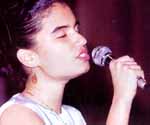 |
Diane de Kerckhove, BSc'95 (physics)
Rhodes Scholar 1995
DPhil, Nuclear Physics
Balliol College, Oxford
At first I thought I'd have no chance at the Rhodes Scholarship since my "sport" was dancing: ballet, modern and jazz ballet. However, the committee was quite open-minded, much to my delight!
The question which stayed in my mind was: "If you could meet anyone in the world, who would it be?" I finally decided on three: Socrates, for his incredible wisdom and rhetorical skills. I think it would be bliss to just listen to him unravel other people's arguments and pick out the flaws; Billie Holiday, because she was one of the greatest jazz singers ever, and her life was incredibly difficult. Her songs and voice seemed to convey a whole palette of emotions and heartache while at the same time rising above them. And, finally, Eleanor of Aquitaine, because she was a powerful and enigmatic woman in her day, and I would have loved to talk about her marriages, and politics in the Middle Ages.
I am doing my DPhil at Balliol College in the Nuclear Physics Laboratories. My research involves using a scanning proton microscope, which allows for mapping the trace elements in a sample, among other things. For example, last year I analyzed hair from the 5,300-year-old Iceman (the mummy found frozen in the Alps between Austria and Italy) and was interviewed on television with my supervisor.
Oxford's social life is unique: formal dinners and "bops" (disco nights) abound. On any given winter's night, one never fails to bump into a few 17-year-old "freshers" (freshmen), clad in full tuxedo or ball gown, on their way to a college ball. There must be something about the gorgeous towers and spires of Oxford's medieval and renaissance architecture which inspires us to dress accordingly.
|
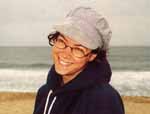 |
Lisa Grushcow, BA'96
MPhil in Judaism and Christianity in the Gręco-Roman World
In talking with other Rhodes Scholars at Oxford, the conclusion is that we are defined by our differences. Someone who won in Quebec would have faced a remarkably different committee in Georgia, and vice versa.
Overall, I found the interview at the provincial level to be less intense than those at McGill, albeit more nerve-wracking. The question I do remember is the one which I answered before they finished: the dreaded question about athletics. The committee may well have suspected my lack of coordination, if nothing else, given that I began by knocking over my water glass. "We see that you've studied martial arts, ballroom dancing, fencing" the interviewer began. "Yes," I interrupted, "it means I'm lethal on the dance floor."
Afterwards, I plan to study at the Jewish Theological Seminary in New York. My dream is to come back to Montreal as a rabbi, working as an activist, community leader, teacher, and to be a perpetual student.
|
 |
Carellin Brooks, BA'93
Writer, Vancouver
"I'm a very envious person," Brooks says. "I saw another McGill student who had a Rhodes Scholarship and she didn't look very special. She wasn't my idea of the Rhodes Scholar: blond hair and big teeth, really white clothes that never got stained."
In applying for the Rhodes, a McGill law professor advised her not to say she was gay. She replied: "I don't think I can do that." Openly, she won. "There's one 'big' lesbian Rhodes Scholar each year," Brooks says. "We all know each other because the gay scene at Oxford is small." Now back in Vancouver, Brooks is finishing her PhD thesis, "The Phallic Woman in the 21st Century," and has struck the Rhodes from her resume. "I feel pressure to do something really fabulous that's seen as fabulous by a lot of people. I'm a writer so that's going to take years and years. The Rhodes Scholarship has become a curse: I've taken it off my resume."
Having had lots of bad jobs most recently as an $8-an-hour administrator at a sex chat line most recently as an $8-an-hour administrator at a sex chat line she's editing a book on "Bad Jobs." Any alumni with witty, bleak commentaries can contact her at arsenal@pinc.com or (604) 708-9025. she's editing a book on "Bad Jobs." Any alumni with witty, bleak commentaries can contact her at arsenal@pinc.com or (604) 708-9025.
|
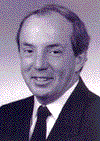 |
The Rhodes Scholar who Never Was
P. André Gervais
Chairman and Partner
Mackenzie Gervais
Montreal
In 1954, Sherbrooke law student André Gervais was named one of two Rhodes Scholars for Quebec. The joy was short-lived. "One day I came home and found a big envelope with all my documents returned and a letter saying I was too old by three days by three days for the Rhodes Scholarship. My birthday was September 27 and the cut off date was October 1." Gervais didn't misrepresent his birthdate for the Rhodes Scholarship. My birthday was September 27 and the cut off date was October 1." Gervais didn't misrepresent his birthdate rather, the selection committee hadn't noticed it at the onset. rather, the selection committee hadn't noticed it at the onset.
"I was really crushed by it. My dad had died the year before (1953) and I was too young and naïve to protest," he recalled recently. André Gervais finished out his fourth year at McGill's Faculty of Law then wrote the bar exams. The lack of a Rhodes Scholarship hasn't hindered his progress up the legal ladder: he currently heads the Canadian Bar Association and is a mediator in alternative dispute resolution. Would he fight the Rhodes Committee on that point today? You bet.
|
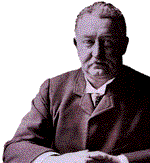 |
Cecil Rhodes
Before the Right Honourable Cecil John Rhodes passed on to his final reward in 1902, he left his unequivocal mark on the world of higher education. By providing a bequest that allowed a select few the opportunity to study at what was then, and still is, one of the most respected institutions in the world Oxford University Oxford University Rhodes ensured his name would live on well beyond his death. The scholarships were to be awarded to young students from the colonies of the British Empire who displayed strong "literary and scholastic achievements...fondness and success in outdoor sports...truth and courage...[and] moral force of character and instincts." And for a man living just around the time when slavery was abolished, Rhodes was a broad-minded enough fellow, leaving instructions that "no student shall be qualified or disqualified for election to a Scholarship on account of his race or religious opinions." His broadmindedness, however, did not go so far as to include women as candidates for the scholarship, who have only been eligible since 1976. Rhodes ensured his name would live on well beyond his death. The scholarships were to be awarded to young students from the colonies of the British Empire who displayed strong "literary and scholastic achievements...fondness and success in outdoor sports...truth and courage...[and] moral force of character and instincts." And for a man living just around the time when slavery was abolished, Rhodes was a broad-minded enough fellow, leaving instructions that "no student shall be qualified or disqualified for election to a Scholarship on account of his race or religious opinions." His broadmindedness, however, did not go so far as to include women as candidates for the scholarship, who have only been eligible since 1976.
Rhodes' initial bequest was close to £3 million, and the original scholarships were worth £300, quite a sum of money in 1904, when the first round of scholarships were awarded. But tuition at Oxford now runs into the tens of thousands of pounds for some programs, and current day Rhodes Scholars have tuition paid in full and a "maintenance allowance" for living expenses and the like, all told an award of about US$20,000 per year.
While Rhodes' colonial mentality he dreamed of a world completely under British rule he dreamed of a world completely under British rule and the fact that his fortune came from diamond mining and the exploitation of South Africa are disconcerting to some Rhodes Scholars nowadays, it's understood that the scholarships are now simply awarded to outstanding students. No longer do they serve Rhodes' initial purpose of "instilling into their minds the advantage to the Colonies as well as to the United Kingdom of the retention of the unity of the Empire." and the fact that his fortune came from diamond mining and the exploitation of South Africa are disconcerting to some Rhodes Scholars nowadays, it's understood that the scholarships are now simply awarded to outstanding students. No longer do they serve Rhodes' initial purpose of "instilling into their minds the advantage to the Colonies as well as to the United Kingdom of the retention of the unity of the Empire."
Indeed, in some ways, the tables have been turned on Cecil Rhodes. In 1953, The Canadian Rhodes Scholars Foundation began a "Reverse Rhodes Scholarship," awarded to an outstanding British National student, who is brought to a Canadian university on a scholarship that carries a similar value to the Rhodes. Their full tuition and fees are paid and they receive an additional $6500 stipend. One such Reverse Rhodes Scholar, Claire Roff, a concert violinist, has just completed her studies in music at McGill. No doubt the Reverse Rhodes isn't exactly what ultra-patriot Cecil Rhodes was thinking of when he spoke of uniting "the Colonies," but it's nice to know that we have returned the Rhodes honour in our own way.
|
|






